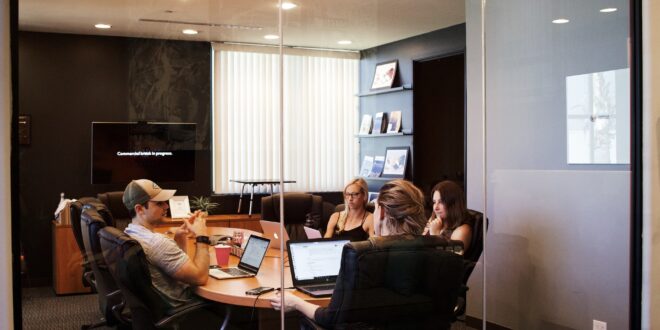Many companies have had positive experience working remotely during the epidemic. As a result, several firms are already preparing to transition to flexible workplaces, reducing total space requirements and bringing fewer people into workplaces each day.
According to a McKinsey study, 278 CEOs planned to decrease available workspace by 30% on average. What started as a temporary alternative to continue work has gained more traction than previously predicted, causing a massive change in where and how businesses operate.
It is estimated that about 20% of industrialized economies’ labor forces could work remotely three to five days per week—this is four to five times the amount of remote work done before the epidemic.
5 Tips for Competing in a Remote Workforce
Over the past decade, there’s been increased interest in workplace flexibility. Even before the pandemic, studies showed that 80% of employees wanted to work from home at least part time. More than a third of those surveyed said they would take a wage reduction in return for remote work. However, because COVID-19 has exacerbated remote work, the current employment economy has become increasingly competitive. With that in mind, here are five tips to help you compete in a remote workforce:
1. Redesign Your Resume
A great resume can mean the difference between an interview and a missed opportunity. It needs to create a great first impression and communicate the skills that make you the best person for the job.
To highlight yourself in a recruiter’s search for remote prospects, use keywords the same way you would while looking for a job. Make sure that the words “remote” or “remote-ready” are prominently displayed on your CV.
Any past remote job experience you have should be emphasized. If you previously worked physically but coordinated with other teammates who were not onsite, provide that information on your CV as well. The two objectives here are to:
1. Raise your presence in employer searches
2. Demonstrate your preparation, prior experience, and capacity to work remotely.
Your resume design should also reflect the position you’re applying for. For example, if you’re applying to a creative job, you have more freedom to design an aesthetically pleasing and unique resume. Whereas if you’re applying to a corporate job, you might want to stick to a tried-and-true structure.
Either way, format and appearance are crucial. You can find plenty of beautifully designed resume templates on websites like Etsy. A simple Google search “resume templates” in your industry will also yield plenty of results.

2. Build Your Skillset
When you build your skillset, keep in mind the skills required for your remote job. Being able to interact in a remote setting successfully, for example, is a crucial need for all workers at any remote organization. Remote communication necessitates substantial use of the internet and digital tools. This requires familiarity with project management software, video conferencing applications, and company-specific social channels.
Take courses online that equip you for the work that you are applying for. Platforms like CareerProgress can help you find job-specific educational courses that allow you to stand out amidst a sea of other applicants.
Take courses that will furthermore boost your resume and experience. For example, if the positions you’re applying to tend to require some Salesforce experience, now would be a good time to become officially Salesforce certified. Pay attention to the commonalities between the applications you’re applying for and take note of tools and skills you can learn to better appeal to hiring managers.

3. Start Networking
Considering how saturated the job market is, relying on mere resumes to stand out shouldn’t be your only tactic. After you apply to a position, connect with a few recruiters or hiring managers on Linkedin and contact them to express interest in the position. LinkedIn also offers several groups that you can join to connect with people based on their career, geography, personal ambitions, hobbies, and more.
You can also network with students and alumni. Your shared educational background can offer a solid foundation for developing professional and personal ties. Another option is to join meetups or attend conferences. Word of mouth works as one of the most effective strategies while job hunting. You never know who needs your service or who can serve as the recommendation you need.
Websites like Meetup.com are also great resources to find relevant industry meetups in your area. These offer an opportunity to meet like-minded people who can become valuable assets during your job search.

4. Prepare for phone or video interviews
The remote model has evolved the interview process as well. As a result, you should always be prepared for phone or virtual interviews and the challenges that come with them. You may get calls from unknown numbers, which could be recruiters. While receiving calls from unknown numbers, always answer with eagerness. Here are a few tips for phone calls:
1. Find a peaceful place to speak.
2. Check for adequate lighting and functionality prior to an interview.
3. Make sure your microphone is functional.
4. Familiarize yourself with the video-conferencing platform you’ll be using for the interview.
5. A bot may question you, so prepare to treat an automated interview the same way you would a real one.
6. Maintain eye contact during video interviews.
It also helps to record a staged video interview before hand, which gives you time to practice providing answers to common questions out loud. From here, you can review your video and see what you can improve upon. You can also send the video to friends who can offer valuable critique.

5. Prepare for Position
Once you’ve been recruited, you have to prove yourself capable of handling all challenges that come with remote working. Be honest about what you can and can’t do depending on your current living condition, and inform your supervisors. Don’t burden yourself with too much work to seem competent. Find a workplace that meets your technological needs and set arrangements with family members to reduce distractions in your workspace.
 Imagup General Magazine 2024
Imagup General Magazine 2024



